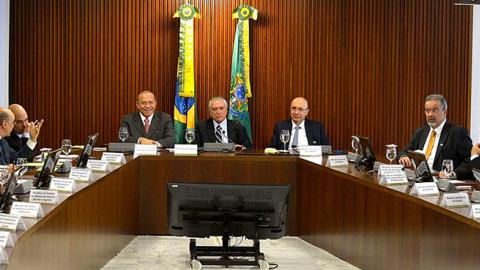Brazilian President Michel Temer is still standing his ground after last week’s bombshell bribery revelation, but the pressure is mounting, and the momentum for his economic reform drive is stalling. FT
Blindsided by a scandal in which an executive of Brazilian meatpacker, JBS, secretly taped a conversation that showed the president allegedly endorsed bribe paying, Mr Temer is burnishing his reformist credentials amid growing calls for his impeachment.
“Brazil will not go off the rails,” he said during an address in which he rejected the allegations and claimed the tape had been doctored. “We are completing the reforms to modernise the Brazilian state. My government is going in the right direction.” […]
In a signal that he is digging in for a protracted fight, Mr Temer told newspaper Folha de S. Paulo that he would not resign even if he was indicted.
But if Mr Temer was forced to resign or was impeached, congress would choose a stopgap president to serve out the rest of the current term, which ends in 2018. Many are calling for snap elections but this would require difficult constitutional changes.
To lose one President to a corruption scandal may be regarded as a misfortune. To lose two in a row begins to look like carelessness.
The leadership crisis is both an internal problem for Brazil—where important reforms to its destructive pension system may well fail thanks to the latest Presidential scandal—as well as an international issue. As Venezuela edges toward a total breakdown with the potential of civil unrest and even civil war, a strong and calm Brazilian presence on the scene could help resolve things while keeping the U.S. in the background. That would be good for everyone. But a divided Brazil, turning inward and dealing with yet another outbreak of scandal, cannot play that role.
On the other hand, if the Lava Jato (Car Wash) scandal has shown us anything, it is that the political class in Brazil is rotten to the core, and that more and more Brazilians are sick of it. Inconvenient as it may be, it’s important that Brazil continue to hammer away at the corruption of its government, parties, and state-aligned companies.

















